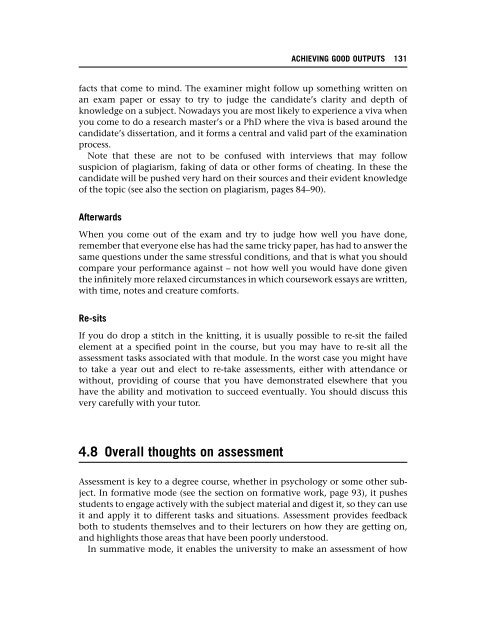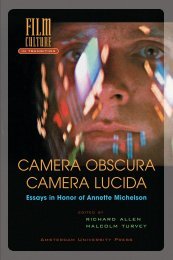Psychology - Forgot your username
Psychology - Forgot your username
Psychology - Forgot your username
You also want an ePaper? Increase the reach of your titles
YUMPU automatically turns print PDFs into web optimized ePapers that Google loves.
facts that come to mind. The examiner might follow up something written on<br />
an exam paper or essay to try to judge the candidate’s clarity and depth of<br />
knowledge on a subject. Nowadays you are most likely to experience a viva when<br />
you come to do a research master’s or a PhD where the viva is based around the<br />
candidate’s dissertation, and it forms a central and valid part of the examination<br />
process.<br />
Note that these are not to be confused with interviews that may follow<br />
suspicion of plagiarism, faking of data or other forms of cheating. In these the<br />
candidate will be pushed very hard on their sources and their evident knowledge<br />
of the topic (see also the section on plagiarism, pages 84–90).<br />
Afterwards<br />
When you come out of the exam and try to judge how well you have done,<br />
remember that everyone else has had the same tricky paper, has had to answer the<br />
same questions under the same stressful conditions, and that is what you should<br />
compare <strong>your</strong> performance against – not how well you would have done given<br />
the infinitely more relaxed circumstances in which coursework essays are written,<br />
with time, notes and creature comforts.<br />
Re-sits<br />
If you do drop a stitch in the knitting, it is usually possible to re-sit the failed<br />
element at a specified point in the course, but you may have to re-sit all the<br />
assessment tasks associated with that module. In the worst case you might have<br />
to take a year out and elect to re-take assessments, either with attendance or<br />
without, providing of course that you have demonstrated elsewhere that you<br />
have the ability and motivation to succeed eventually. You should discuss this<br />
very carefully with <strong>your</strong> tutor.<br />
4.8 Overall thoughts on assessment<br />
ACHIEVING GOOD OUTPUTS 131<br />
Assessment is key to a degree course, whether in psychology or some other subject.<br />
In formative mode (see the section on formative work, page 93), it pushes<br />
students to engage actively with the subject material and digest it, so they can use<br />
it and apply it to different tasks and situations. Assessment provides feedback<br />
both to students themselves and to their lecturers on how they are getting on,<br />
and highlights those areas that have been poorly understood.<br />
In summative mode, it enables the university to make an assessment of how






